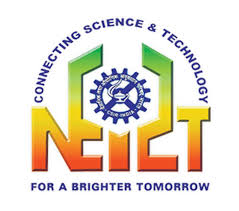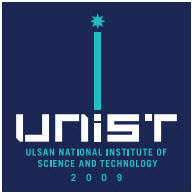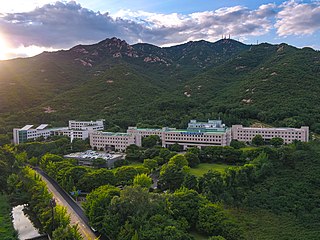
Yeungnam University is a private research university located in Gyeongsan, North Gyeongsang, South Korea. The university's predecessors, Taegu College and Chunggu College, were founded in Daegu in 1947 and 1950 respectively. In 1967, the two colleges were merged by President Park Chung Hee to form Yeungnam University. In 1972, the university's new main campus opened in Gyeongsan east of Daegu. The university includes colleges of Law and Medicine as well as a university hospital. It ranked 1st in the rate for passing the bar exam for the second straight year (2015~2016), it also ranked 6th in providing CEOs in Korea's top 100 companies (2015), and 6th in providing the CEOs in Companies listed on KOSDAQ (2014). Yeungnam University is ranked 501 in the Academic Ranking of World Universities by Shanghai Jiao Tong University.
Chungnam National University is one of ten Flagship Korean National Universities located in Daejeon, South Korea.

The Korea Institute of Science and Technology is a multi-disciplinary research institute located in Seoul, South Korea. Founded in 1966, it was the first multi-disciplinary scientific research institute in Korea and has contributed significantly to the economic development of the country, particularly during the years of accelerated growth in the 1970s and 1980s. It has a research staff of over 1,800 research scientists, visiting scientists, fellows and trainees, and foreign scientists involved in basic research in various fields of science and technology.

The National Research Foundation of Korea (NRF) was established in 2009 as a merger of Korea Science and Engineering Foundation (KOSEF), Korea Research Foundation (KRF), and Korea Foundation for International Cooperation of Science and Technology (KICOS). It provides support for research into new theories for the advancement of science, the arts, and the Korean culture in general. The foundation was first established in 1981. Its offices are located in 25 Heolleung-ro, Seocho-gu, Seoul and 201 Gajeong-ro, Yuseong-gu, Daejeon.

The Directorate of Defense, Research, & Development, abbreviated Maf'at (מפא"ת), is a joint administrative body of the Israel Ministry of Defense (IMOD) and the Israel Defense Force (IDF).

Sahand University of Technology (SUT) (Persian: دانشگاه صنعتی سهند, Danushgah-e Sân'ti-ye Sihend) Sahand University of Technology (SUT) as the first technical university in Iran after Islamic revolution was established in 1989 in Osku County, SUT located in the north-west hub of industries and endeavors to fulfill the essential needs either for educating high skilled committed engineers, researchers, and scientists for performing research and development projects. SUT offers over 20 BSc programs and more than 100 graduate programs of study in engineering, science and technology, which are consistent with the needs of the region and the country.
Jeonbuk National University is one of ten Flagship Korean National Universities founded in 1947, located in Jeonju, South Korea. Jeonbuk National University has been ranked 551–560th in the world by QS Top Universities Ranking in 2023.

National Taiwan University of Science and Technology, abbreviated as NTUST or TaiwanTech, is a public university located in Taipei, Taiwan. TaiwanTech was established in 1974 as the National Taiwan Institute of Technology, as the first and the leading higher education institution of its kind within Taiwan's university of science and technology educational system. NTUST and National Taiwan University as well as National Taiwan Normal University formed an academic league named National Taiwan University System,In addition, the number of international master's and doctoral students at NTUST is the largest in Taiwan.

The Ministry of Economy, Trade and Industry, METI for short, is a ministry of the Government of Japan. It was created by the 2001 Central Government Reform when the Ministry of International Trade and Industry (MITI) merged with agencies from other ministries related to economic activities, such as the Economic Planning Agency.

The Agency for Defense Development is the South Korean government agency for research and development in defense technology, funded by the Defense Acquisition Program Administration (DAPA). It was established in August 1970 under the banner of the self-reliant national defense promoted by President Park Chung Hee.

MIREA — Russian Technological University is The Federal State Budget Educational Institution of Higher Education «MIREA — Russian Technological University». It is a higher educational institution in Moscow, Russia, which is an educational, research and innovation complex. It was ranked # 1,960 globally in 2023 by US News & World Report.

North East Institute of Science and Technology (NEIST) (formerly Regional Research Laboratory) is a constituent establishment of the Council of Scientific and Industrial Research (CSIR), a premier R&D organization of India, which has a chain of laboratories across the country. This laboratory was established in 1961 under the chemical science group of CSIR and originally its main aim was to develop indigenous technologies by utilizing the immense natural resources of northeastern India like Petroleum, Coal, Natural Gas, Minerals, Tea, Microbes, Aromatic and Medicinal plants.
The Riyadh Techno Valley (RTV) is one of the contributions of King Saud University in building partnership with the public and private sectors in the area of knowledge economics. The Kingdom of Saudi Arabia has adopted a long term economic strategy that shifts its focus to develop a knowledge-based economy. King Saud University (KSU) is seeking to play a full part in this strategy through the development of a substantial science and technology park, “Riyadh Techno Valley - King Saud University (RTV-KSU)”, on its Riyadh campus. Through this project, KSU aims to satisfy the demands of the knowledge-based industries, and to commercialize its research outcomes, in addition to enhancing the research environment and encouraging researchers and graduates to participate in the incubation program and to establish spin-off knowledge-based companies.

Institut Pasteur Korea is an infectious disease-focused research institute located in Gyeonggi Province, Rep. of Korea. Its mission is to identify novel molecular targets and discover small molecules by utilizing its proprietary platforms to diagnose, treat and address serious unmet global public health needs.

Ulsan National Institute of Science and Technology, is one of the four public universities in South Korea which are dedicated to research in science and technology, along with KAIST, GIST, and DGIST. UNIST was founded in 2007 in response to growing demand for higher education in the Korean industrial capital of Ulsan, where world-renowned automotive, shipbuilding, petrochemical, and secondary cells industries are clustered. At the time of its foundation, UNIST was known for being the first national university in South Korea to be incorporated and thus administered by an independent board of trustees despite being funded by the central government.

The Korea Testing & Research Institute (Korean: 한국화학융합시험연구원), abbreviated as KTR, is a testing and certification institute in South Korea which performs integrate testing, certification, and technical consulting for all fields of the industry.
The Korea Carbon Capture & Sequestration R&D Center (KCRC) is an institution in Daejeon, South Korea, specialized in Carbon Capture & Sequestration (CCS) R&D. The Korean government has selected CCS technology as part of core technologies for green growth, and has established the National Comprehensive Plan for CCS to commercialize and ensure the international competitiveness of CCS technology by 2020. As part of the plan, the Ministry of Science, ICT and future Planning (MSIP) has developed the ‘Korea CCS 2020 Project' to secure the best original technology of CCS and established KCRC on December 22, 2011.

Daegu Gyeongbuk Institute of Science and Technology is a public science and engineering university located on Daegu Technopolis, Daegu, South Korea. DGIST is one of the four public universities in South Korea dedicated to research in science and technology, along with KAIST, GIST, UST, and UNIST. Under the Special Act on Support of Scientists and Engineers for Strengthening National Science and Technology Competitiveness, the Korean government enacted the Daegu Gyeongbuk Institute of Science and Technology Act and founded DGIST in 2004 as a research institute. In 2008, the act was amended to extend the role of the institute to both research and education, which eventually enabled a transition from research institute to university for DGIST.

Shin Sung-chul is a South Korean physicist and the 16th president of KAIST. Shin was the first president of DGIST since it changed its form from a research institute to a university in 2011. His main research areas as a scientist are spintronics and nanomagnetism. As of June 2014, Shin is the founding president of DGIST university, Fellow Professor of University of Ulsan, a member of Presidential Advisory Council on Science & Technology (PACST), the chair of Committee for Future Strategy, PACST, and a Fellow of the American Physical Society (APS).
The Bangladesh Computer Council (BCC) is a statutory government organization operating under the Information and Communication Technology Division of the Ministry of Posts, Telecommunications, and Information Technology of the government of Bangladesh. Its headquarters are situated in Agargaon, Dhaka, Bangladesh. It was initially known as the National Computer Committee (NCC) in 1983 and transformed into the Bangladesh Computer Council through Act No. 9 of the National Parliament in 1990.

















